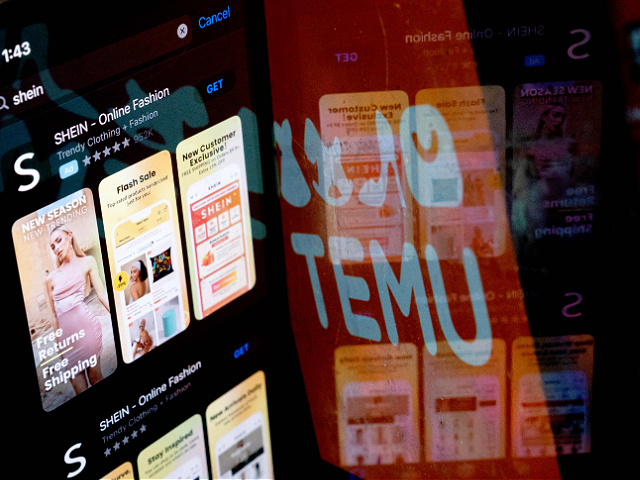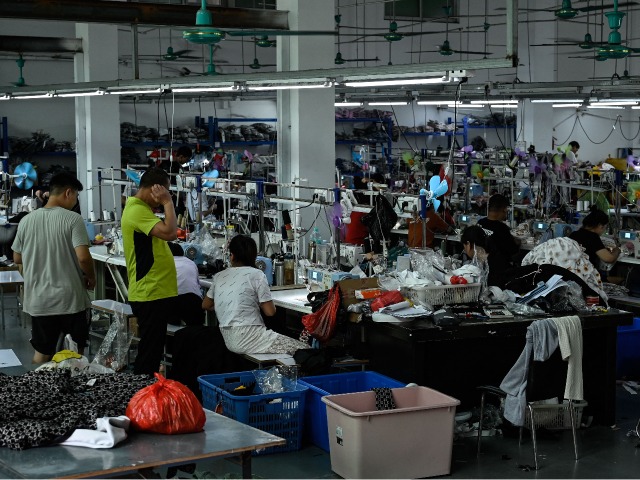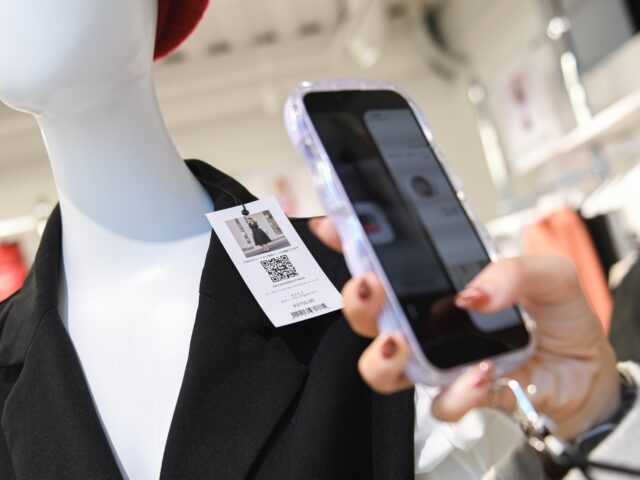A group of graphic designers filed a lawsuit against the Chinese online “fast fashion” company Shein for stealing their designs, Time magazine reported on Sunday, accusing the retail giant of violating the Racketeer Influenced and Corrupt Organizations (RICO), a federal law classically used to target organized crime syndicates.
Shein sells cheaply made clothing, most prominently targeting young women, primarily through a mobile phone application. It is a major player in the American fashion market, responsible for about half of “fast fashion” purchases in America, according to the U.S.-China Economic and Security Review Commission in April. Shein documented $100 billion in sales last year.
Much of its sales are driven by its gigantic social media presence, fueled by “influencers” on Instagram and China’s Tiktok.
The company, along with similar direct-to-consumer Chinese retailers such as Temu, has faced increased Congressional scrutiny this year as a result of documented human rights abuses, including ties to the Chinese government’s Uyghur slave trade, and documented instances of it manufacturing and selling items using stolen designs. The lawsuit filed last week addresses the latter situation.
“Shein has grown rich by committing individual infringements over and over again, as part of a long and continuous pattern of racketeering, which shows no sign of abating,” attorneys for the three plaintiffs – designers Krista Perry, Larissa Martinez and Jay Baron – said in the lawsuit filing. “It is not an exaggeration to suggest that Shein’s pattern of misconduct involves commission of new copyright and trademark infringements every day.”

This photo illustration shows the Shein app on the App Store reflected in the Temu logo, in Washington, DC, on February 23, 2023. (STEFANI REYNOLDS/AFP via Getty)
The lawsuit filing alleged that the plaintiffs, thanks to Shein stealing their intellectual property, have seen their careers “irreparably tarnished, diminishing the value of [their] works, and decreasing revenue derived from [their] work.”
Time reported that one of the plaintiffs, Perry, said that Shein stole a graphic she posted online and only offered her $500 for it after getting caught – then, a year later, offered her an opportunity to sell more designs to the company.
“How dare you contact me after my artwork has been stolen and the hard time I was put through with the people at Shein to resolve it,” the filing Perry as responding to the offer.
The RICO Act was passed in 1970 with the intent of cracking down on La Cosa Nostra, or the Italian mafia, prompting protests from Italian-American groups. Its text is versatile enough to apply to a variety of criminal conduct, however, and has found renewed application against jihadist organizations and in copyright lawsuits after copyright infringement was added to the statute as a predicate act in racketeering.
Shein denied the allegations in a statement this weekend.
“SHEIN takes all claims of infringement seriously, and we take swift action when complaints are raised by valid IP rights holders. We will vigorously defend ourselves against this lawsuit and any claims that are without merit,” a spokesperson told the U.K. Independent, echoing language issued to the Associated Press and others.
The lawsuit is the biggest challenge so far in a long history of accusations against the Chinese company for stealing designs. Last year, the government of Mexico joined the chorus of protests accusing Shein of selling women’s clothing featuring traditional Mayan designs.
“These designs have been passed down from generation to generation, so they are the product of a collective creativity corresponding to the Mayan people,” the Mexican Ministry of Culture asserted in a letter to the company. “They represent not only their natural surroundings, but they also form part of their cosmovision, because they are related to the joy of living, they reflect their emotions and feelings, and thus they form part of their identity as Maya people and Mayan culture.”
Shein subsequently stopped selling the offending clothing.

Workers at a garment factory that supplies SHEIN, a cross-border fast fashion e-commerce company in Guangzhou, in Chinas southern Guangdong province on July 18, 2022. (Getty)
In addition to copyright infringement accusations, Shein is facing growing scrutiny over reports of abuse against its workers and profiting off of slavery, particularly the Chinese government’s slave trade arising out of the genocide of Uyghur, Kazakh, Kyrgyz, and other Turkic people in East Turkistan. For at least six years, the Chinese Communist Party imprisoned as many as 3 million people in concentration camps, which Beijing claimed were “vocational training” centers. In 2019, China began claiming that thousands of these workers had “graduated” from the “training” centers and began bussing them to factories nationwide. As of 2021, the Chinese government openly sells Uyghurs slaves in “batches of 50 to 100 workers” to interested factories.
To prevent slave-made products from entering the American retail market, Congress passed the Uyghur Forced Labor Prevention Act (UFLPA), which went into effect a year ago. The law creates a legal presumption that any good coming from East Turkistan, the occupied Uyghur homeland, was made with slave labor. Any importer attempting to ship these goods into America must overcome that presumption with proof that their supply chains are clean. The UFLPA contains an exception, however: shipments worth less than $800, known as de minimis, do not go through U.S. Customs scrutiny.
Shein ships its products directly from China to American consumers, eliminating the importer in the middle and reducing significantly the prices of shipments. The average Shein package is worth $11.
“Shein ships small packages direct-to-consumer using a trade loophole known as de minimis entry. Shein abuses this entry category to avoid customs duties and inspections on its unethically produced products,” Sen. Marco Rubio (R-FL) wrote in a letter to colleagues in June. “Shein’s exploitation of de minimis entry prevents scrutiny under UFLPA, cheats taxpayers of customs revenue, and undercuts American competitors that play by the rules.”
“Shein is able to offer this array of products at rock-bottom prices not because of any particular competitive advantage, but because it steals intellectual property, infringes copyrights, exploits U.S. trade law, and uses fabric linked to Uyghur slave labor,” Sen. Rubio noted.
Rep. Mike Gallagher (R-WI), the chair of the House Select Committee on the Chinese Communist Party, similarly accused Shein and fellow Chinese retail app Temu of “building empires around the de minimis loophole … dodging import taxes and evading scrutiny.”
Shein has denied that it uses slave labor – while admitting that testing found cotton from East Turkistan, where the Chinese government uses Uyghur slaves to pick the material, in its clothing. It has also launched a multifaceted public relations campaign featuring high-powered lobbyists and Instagram influencers to combat the negative press around its practices.
In June, Instagram was flooded with content by fashion “influencers” invited to Guangzhou, China, to visit a model Shein factory. The influencers published videos showing pristine manufacturing workstations and boasting that the company paid for “brand-sponsored luxury hotel rooms, excursions in Guangzhou, and a ten-course dinner,” Today reported at the time.
Shein’s reputation has been damaged to such an extent in America that one of the invited influencers, plus-sized model Dani Carbonari, deleted an Instagram reel she had posted in which she claimed that criticism of Shein was a “narrative fed to us in the U.S.” and applauded herself as an “independent thinker” and “investigative journalist” for going on the trip to Shein’s model factory and taking a sponsored tour.
Carbonari responded to the controversy in a video posted to Instagram in which she claimed to “take accountability” for the trip.
“I’m also a human, I make mistakes, I’m imperfect and I’m someone who can take accountability for my actions … I should have done more research,” she said.
The Chinese government, through its state media arms, has condemned scrutiny of Shein and similar applications as “hooligan” behavior.
“If some politicians in Washington only focus on suppressing Chinese apps and making way for American companies, it will not only derail the development of tech sector cooperation between the two countries, but also deprive the US of the opportunities to boost its own internet economy,” the state-run Global Times propaganda outlet warned in an editorial, titled “U.S. Hooligan Measures Unwise in Internet Market Economy,” in late June.

COMMENTS
Please let us know if you're having issues with commenting.